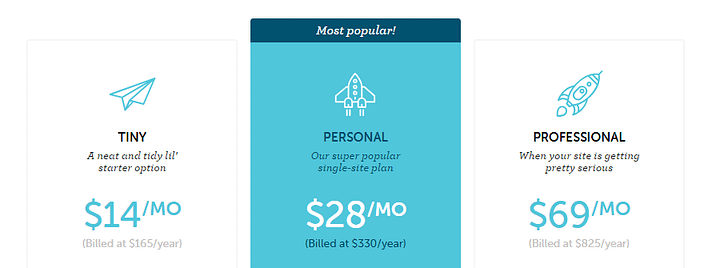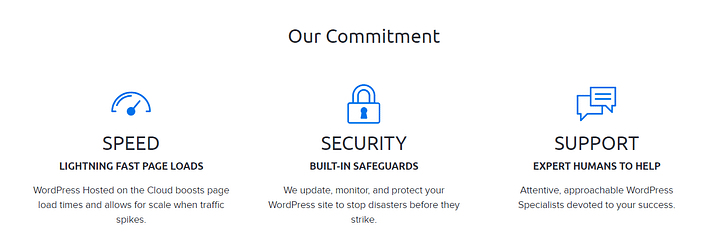What is managed WordPress hosting? In a nutshell, it’s WordPress-specific hosting that adds a number of convenient features to make it easier to manage, secure, and speed up your WordPress site.
Managed hosting isn’t so much a type of plan as it is a description of the service you’ll receive. While most hosting plans leave the majority of the work up to you, managed hosting takes some of the responsibility for keeping your site going off your shoulders. This makes it an intriguing option for many website owners.
What is managed WordPress hosting? Explained in more detail
Shared hosting, for example, is a cheap entry-level option that sees you splitting a server with many other users. On the other hand, a Virtual Private Server (VPS) plan provides you with your own private space on a server, and more resources. At the top tier, you’ll find dedicated hosting, which is expensive but provides you with an entire physical server just for your site.
All these types of hosting plans can also be either ‘managed’ or ‘unmanaged’. Most hosting is unmanaged, which means once you purchase space on a server, you’re largely on your own. Your hosting provider will probably give you a few tools to play with, but the responsibility for maintaining your site’s performance and security (and customizing your server on some plans) is up to you.
So, just what is managed WordPress hosting? As the name suggests, it’s a plan where your provider ‘manages’ your site and server for you. This means it will take care of various key tasks, like updating your site, so you don’t have to. Let’s look more closely at what this might include.
The pros and cons of managed WordPress hosting
As we’ve alluded to, the primary benefit of managed hosting is that it’s a more hands-off option. It also requires less technical know-how. Your hosting provider will help you keep your site in top form, so you can focus your attention on creating content, promoting your business, and other tasks only you can do.
Pros of managed WordPress hosting
There are no set criteria for what a managed plan should look like, so what you’ll get varies from provider to provider. However, most managed hosting options will:
- Take care of updates for you, and create frequent backups of your site for safekeeping.
- Scan your site for security threats, and react quickly to deal with any issues that arise.
- Handle performance optimization, to keep your site running fast at all times.
- Configure your server to meet your needs, if you’re on a VPS or dedicated plan.
- Offer staging sites to help you safely test changes and updates.
- Provide lots of support options to answer your questions.
Primarily, we’re talking about managed WordPress hosting in particular here. This means your provider will also know the platform inside and out. This can be invaluable, especially if you’re new to WordPress and don’t know much about how to optimize your site.
Cons of managed WordPress hosting
So far, all of this sounds pretty great, which may leave you wondering what the catch is. The simple answer is that managed plans are more expensive than their unmanaged variants. Just how much a managed plan will cost you depends heavily on where you get it.
While most entry-level shared hosting costs $5 per month or less, managed hosting tends to cost between $10 and $30 per month on the lowest tiers of a shared or VPS plan:
Managed dedicated plans are far more expensive, although few first-time website owners need that kind of power. In any case, the extra costs will add up over time.
There’s another potential downside to managed hosting. If you’re a more technically-savvy user, you may prefer to configure your server and optimize your site’s performance and security on your own. Managed hosting takes away this option, and has you rely on your provider instead. Whether or not this loss of control is a relief or a problem entirely depends on your pre-existing knowledge and needs.
Additionally, some managed WordPress hosts block certain plugins, like database-intensive related posts plugins.
How to decide whether you need managed WordPress hosting
By this point, you know the answer to the question: What is managed WordPress hosting? This means you’re ready to consider whether it’s the right choice for your site.
There are two key elements to think about here – your budget and your needs. Obviously, you’ll only be able to opt for a managed plan if you can afford it. While most options aren’t exorbitantly expensive, they do involve a greater initial investment.
After, you need to decide whether or not having your site managed for you sounds appealing. In other words, you’ll likely fall into one of two camps:
- If you don’t know much about WordPress, servers, and all the other technical stuff involved in running a website, managed hosting can be a lifesaver. It saves you time and worry, and can result in a site that’s safer and performs more smoothly. Plus, you’ll have access to readily-available help whenever you need it.
- On the other hand, unmanaged hosting is a better option if you prefer to make key decisions for your website on your own. It’s a good option for users with the technical experience to maintain their sites personally, and those with a willingness to learn the ropes over time.
If you do decide that managed hosting sounds like an appealing option, your work isn’t done yet. You still need to find the right plan, since there are plenty of choices.
How to find the right managed WordPress hosting plan for your site
Finding a managed WordPress hosting plan can be a little tricky. As we mentioned earlier, the term “managed” doesn’t have a firm and universally agreed-upon definition. Theoretically, any provider can slap the managed label on its plans. Therefore, you’ll need to be careful and make sure you’re actually getting your money’s worth.
To determine whether or not a managed plan really has something special to offer you, you’ll need to take a close look at the features it provides:
These should include most or all of the key characteristics we discussed earlier. In particular, look to see if the provider will manage updates and backups for you, as it’s a good sign.
Next, see what it provides in terms of security and performance optimization. The provider should be upfront about what it does to keep your site safe and maintain solid speeds and up-time. If in doubt, get in touch with the sales team via chat and ask them outright.
If you’re looking at a VPS or dedicated plan, you’ll also want to find out whether the provider is willing to set up and configure your server (virtual or physical) to meet your needs.
Finally, and perhaps most important, make sure the plan is WordPress-specific.
If you’re leaving the responsibility for maintaining your site in the hands of your hosting provider, it’s vital that they know how to optimize a WordPress site. Look for features such as pre-installed and pre-configured WordPress sites and built-in plugins to handle backups and caching.
Conclusion
If you need a hosting plan for your site, the good news is that there are a lot of choices. On the other hand, this can make the decision a little tricky. Not only do you need to find the right provider, but you also need to figure out what kind of plan is right for you and your site.
For instance, when browsing plans you may find yourself trying to understand just what is managed WordPress hosting. As it turns out, the name gives away the purpose of these plans – to manage and maintain your site for you. Managed WordPress hosting plans aren’t for everyone, but they can save you a lot of time, and take technical tasks you’re not comfortable with off your shoulders.


